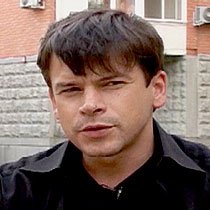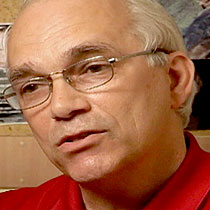2007年VOA标准英语-Russian Journalists Face Life and Death Struggl(在线收听)
Moscow
09 July 2007
The New York-based Committee to Protect Journalists says 13 journalists have been murdered because of their reporting since Russian President Vladimir Putin assumed power in the year 2000. The list, issued in April, is entitled "Russia: 13 Murders, No Justice." Anya Ardayeva reports.
 |
| Andrei Kalitin |
On June 14th, an unidentified gunman shot him in the shoulder outside his apartment building. Kalitin says he is convinced it was not a robbery. He believes the attack was connected with his job. "I am convinced it was an assassination attempt. I don't believe it had anything to do with hooliganism because there was no conflict, and hooligans just don't shoot this way, when they point at you, take their time and then shoot."
But 13 of Kalitin's colleagues have died, including Novaya Gazeta newspaper reporters Anna Politkovskaya and Igor Domnikov; the editor of the Russian version of Forbes, Paul Khlebnikov; and a number of other journalists believed to be victims of contract-style killings.
Media freedom watchdogs first became alarmed in January 2001, when Russian state gas monopoly Gazprom took control of NTV, the last independent nation-wide television network.
 |
| Mikkhail Meinikov |
One of the reasons is that Russian public opinion and Russian officialdom seem indifferent to the plight of journalists.
Andrei Kalitin is bitter. "No one needs honest journalism in Russia these days. I am not only talking about what I am doing, I am talking about what my colleagues are doing, some serious investigations. No one pays attention. Before, criminal cases were started after our publications; some people were caught and put into prison. This was all serious. Now nobody cares."
 |
| Television control room |
And Mikhail Melnikov says it is not exactly the Russian president, but authorities at lower levels and often journalists themselves who avoid writing about certain topics in order to keep their jobs -- and lives. "Don't write about anything that could uncover corruption in power organs, for example, connections between power organs and crime. Don't write about law enforcement organs. Don't write about Chechnya in a negative way. Don't write about the so-called 'hot spots' in a way that it would make it look like state catastrophe. Write posititvely, bring more positive emotions."
This "positive news" policy was exactly the reason why several reporters from the nation-wide radio agency Russian News Service quit their jobs in May after, they charge, new editors demanded they bring the amount of "negative news" down to 50 percent of airtime and banned all live reports.
Some of them quickly found new jobs. Dmitri Mungalov now works for the Russian edition of "Newsweek". "We had our own editorial policy, which was all about full objectivity, and presenting two points of view on every subject. But after the new editors came about, it was clear that none of that is going to continue."
But there are others whose job of an investigative report is a threat to their lives no matter who they work for, even for a state-controlled TV network. Andrei Kalitin says, "If I say I am not scared, I would look like an idiot. Honestly, I am afraid and I don't know what's coming next. It might get even worse. But I am going to do what I was doing, because it was vitally important to me. I can't do my job any other way, so I have to do it. It's just it will be scarier now.
Kalitin says that although the police have shown willingness to investigate the attack, he doubts the gunman who shot him will ever be found.